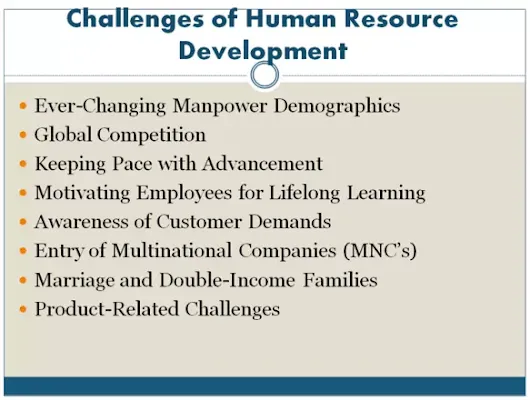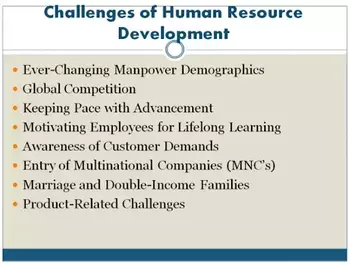Table of Contents:-
- Challenges of HRD
- Principles of HRD
Challenges of HRD
The job of a Human Resource Development department is not without challenges and complexities, which arise because the HRD is not an isolated function; it is linked to all the other departments of an organisation, whose end purpose is business. Business involves profits and losses, risks and competition.
The major challenges faced by HRD can be listed as follows:

1) Ever-Changing Manpower Demographics: An HRD department needs to match steps with changing manpower demographics. Nowadays the pace of businesses all over the globe is changing very fast. As newer specialisations are emerging, the workforce is becoming more diverse – in terms of skills, qualifications, and in today’s times, ethnicity. Intra-country and inter-country migration of manpower are very common. Employees from diverse backgrounds carry with them their baggage of cultural and moral values, as well as working systems. HRD needs to cope with this diversity. To blend this diversity into a coherent, seatless entity, is indeed a challenging task.
2) Global Competition: With the advent of scientific innovations like the internet and mobile technology, along with relaxed laws for inter-country business, the world has virtually become a smaller place. This has made global business competition an important challenge to face. With not much control over the global prices of commodities, human resources has become a decisive factor.
The challenge before HRD is to change, upgrade and develop manpower according to the changing needs of the business. The business environment has become more complex and highly predictable. This has required HRD departments to come up with novel training methods, systems and strategies to update employees’ skills and knowledge, along with enhancing their preparedness to adjust to newer, and sometimes, unpredictable circumstances.
3) Keeping Pace with Advancement: With science advancing rapidly, there is the availability of newer technology and processes, making older working methods obsolete. For an organisation to maintain pace in this competitive scenario, its HRD department needs to work fast to introduce training and development programmes for employees so that they can acquire newer skills that match newer technology and processes. Organisations that cannot do this have any option but to be left behind in the business race,
4) Motivating Employees for Lifelong Learning: Organisations provide generalised training. The training requirements of individual employees cannot be met by such training programmes. With ever-changing workplace requirements, an employee needs to take up the responsibility of sharpening his skills, expertise and knowledge at every step; this makes his learning a lifelong process. This is not an easy task. The HRD department should take up the challenge of motivating employees to analyse their individual needs for training and take steps to fulfil them.
5) Awareness of Customer Demands: Although the end product is the result of the efforts of all departments and employees, all employees are not aware of the demands of customers regarding the products. To make every employee aware of the market demand, the HRD department should facilitate meetings between production, quality control, design and other relevant departments.
Related Article:- Meaning of Consumer Market
6) Entry of Multinational Companies (MNCs): In a global business environment, mergers and takeovers by MNCs are very common. This results in a blend of diverse cultures and skills. HRD should take up the challenge to see that the skill gap between employees is not so big as to cause the occurrence of conflicts among employees. Weaker employees need to be trained by the employer or should self-train themselves.
7) Marriage and Double-Income Families: In today’s environment of gender equality, there are numerous opportunities for women to make their mark in the workplace. Often, family pressures on women’s marriage compel them to resign. The vacancy created during pregnancy is another challenge for HRD.In cases, where both husband and wife are pursuing their careers, HRD managers need to be flexible while formulating policies for such individuals.
8) Product-Related Challenges: Often market conditions require a reduction in selling price without increasing manufacturing costs, in the phase of stiff competition from substitute products or imported products or due to price wars in the local market. HR managers need to find and recruit efficient candidates at lower costs to the company.
Principles of HRD
The following are the main principles of HRD:
1) Principle of Enhancement of Organisational Capability: First and foremost, human resource development involves the enhancement of inherent organisational capability. Every organisation should pos inherent capabilities to maintain sound intra-organisational health, which means relationships; an organisational culture that has justice at its core, and people working harmoniously towards achieving organisational goals. Diagnosing problems as they arise, solving these problems in the healthy working minimum possible time, and well-supported systems are important aspects of organisational capacity.
2) Principle of Potential Optimisation: Various HRD sub-systems should help employees optimise their working potential to deliver the best results.
3) Principle of Facilitating Maximum Autonomy: HRD systems should facilitate maximum autonomy to go hand-in-hand with responsible behaviour. The more responsible an individual is, the more suitable he is to act independently.
4) Principle of Effective Delegation: To maximise efficiency, HRD systems should ensure delegation of work whenever feasible, thus enabling a balanced distribution of workload and authority.
5) Principle of Participative Decision-Making: This is an important principle of HRD as the maximum possible participation of employees in decision-making ensures that individual inputs contribute to the achievement of the best results.
6) Principle of Efficient Management of Transition: HRD systems should strive to ensure a smooth transition from an existing culture to a new organisational culture.
7) Principle of Periodic Review: HRD systems should be subjected to periodic review, and changes in policies and functions should be made, as and when required.
You May Also Like:-
Methods of Management Development
Workers Participation in Management
Features of Management Development
Human Resource Development Mechanisms
Process of Human Resource Planning
360 Degree Performance Appraisal
Limitations of Human Resource Planning
Difference between Personnel Management and HRM
